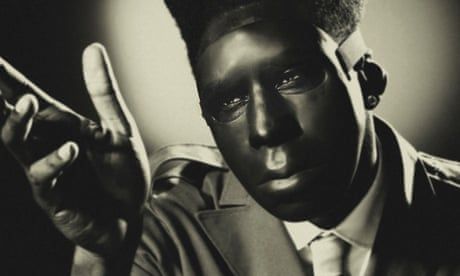
(Columbia Records)
Full of switchback turns, the rapper’s unsettled and unsettling seventh album zaps from Beach Boys harmonies to G-funk synths – and from boasts to self-loathing
News of Tyler, the Creator’s seventh album came as something of a surprise: it arrived a matter of months after he announced on social media that he wouldn’t be releasing any new music this year. The promotional campaign over the last couple of weeks suggested that Chromakopia would be a high-concept piece of work, the kind of album that takes listeners a long time to fully unpick. It involved a succession of mysterious videos that shifted from the sepia tones of an old TV show into full colour, sometimes – but not always – featuring the rapper wearing a mask and a military uniform: directing a platoon of men into a shipping container with the album’s title emblazoned on its side, which he then blew up; barging his way through a crowd of people before being assailed by a fan whose enthusiasm turns into a kind of eye-rolling madness and whose phone becomes a gun; rapping on top of a military aircraft within which his masked alter ego lurks, glowering. Speculation as to what it all meant followed, as it was clearly intended to: one frequently floated theory was that the album would involve the debut of new persona, possibly based on a character from the classic children’s novel The Phantom Tollbooth.
But, like the announcement that no new music was forthcoming, the business with the mask appears to be misdirection, at least as far as an alter ego is concerned. Lyrically, Chromakopia gives every impression of being both prosaic and personal: it feels somehow telling that none of the album’s guest artists – Lil Wayne and Childish Gambino among them – have been listed on streaming services, as if trumpeting their presence would distract from its inward-looking mood. There’s stuff about the pressures of fame (Noid and Rat Tah Tah prickle with distrust of everyone from Tyler, the Creator’s accountants to his fans) and a swaggering dismissal of his critics on Thought I Was Dead, but the main lyrical themes that run through it are the kind of worries that tend to beset people at that point in your 30s where it becomes abundantly clear to even the most ostensibly irresponsible and carefree individual that you’re now an adult. Whether your failure to find a lasting relationship thus far means you’re fated to live the rest of your life alone; whether parenthood is something you’re capable of embracing; whether you’re doomed to repeat the mistakes made by your own parents; whether the career you’ve been pursuing is sufficiently rewarding in and of itself.
Continue reading...